Bruce Harlick | |
|---|---|
 Bruce Harlick in 2003 | |
| Nationality | American |
| Occupation | Game designer |
| Known for | Role-playing games |
Bruce Harlick is a game designer who has worked primarily on role-playing games.
Bruce Harlick | |
|---|---|
 Bruce Harlick in 2003 | |
| Nationality | American |
| Occupation | Game designer |
| Known for | Role-playing games |
Bruce Harlick is a game designer who has worked primarily on role-playing games.
Bruce Harlick became the first employee of Hero Games in 1982. [1] : 146 Harlick was a gamemaster running a Champions campaign in the fictional Ocean City for his fellow employees. [1] : 146 He edited the supplements Champions II (1982), [2] [3] and Enemies II (1982). [4] His Champions characters Marksman and Foxbat appeared in the Champions comic book series (1986-1987) from Eclipse Comics after Dean Mullaney secured licensing rights; after some of the licensing rights were pulled, the characters continued as Huntsman and The Flying Fox, respectively. [1] : 149 Harlick also worked for TSR as an editor on Dark Sun supplements, such as Merchant House of Amketch (1993), Marauders of Nibenay (1993), and The Ivory Triangle (1993).
Harlick later replaced Monte Cook as line editor for the Hero System books at Iron Crown Enterprises. [1] : 149 Harlick and Bill Robinson took over as editors for the magazine Adventurers Club , after issue #18 had appeared in fall 1992, and after promising to revive the magazine issue #19 was published a few months later and issue #20 after that. [5] Harlick contacted Chris Avellone, [6] asking him to write a character book for Champions, which he agreed to, resulting in 1993's Underworld Enemies. [7] [8] Harlick was one of the members of the fanzine Haymaker!, along with fellow Champions writers Steven S. Long, Chris Avellone, and Bryce Nakagawa. [9] He was one of the authors of Enemies Assembled! (1995). [4] Harlick was involved, with Steve Peterson and Ray Greer, in the Hero Games partnership with R. Talsorian Games that began in 1996. [1] : 150 Harlick was one of the authors of the supplement Alliances (1997). [10] [11] Harlick designed Champions: New Millennium (1997), described as a major-spin off that was "a much darker version of the work in which almost all of the world's super-heroes have been wiped out in a millennial apocalypse, and the players' characters must take their places." [12]
When Cybergames.com acquired Hero Games in 2000, Harlick became the new President of the Hero Games division. [1] : 151 Harlick joined the video game industry, becoming part of projects such as The Matrix Online and DC Universe Online for Monolith Productions, a Marvel Comics MMORPG for Sigil Games Online, as well as an Indiana Jones game for LucasArts. [13] Harlick left LucasArts in 2007 and moved to Paragon Studios as lead designer for City of Heroes . [13] [14] [15]
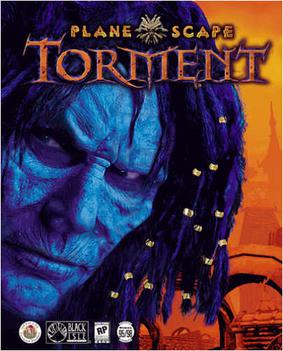
Planescape: Torment is a 1999 role-playing video game developed by Black Isle Studios and published by Interplay Entertainment for Windows. The game takes place in locations from the multiverse of Planescape, a Dungeons & Dragons (D&D) fantasy campaign setting. The game's engine is a modified version of the Infinity Engine, which was used for BioWare's Baldur's Gate, a previous D&D game set in the Forgotten Realms.

Warren Evan Spector is an American role-playing and video game designer, director, writer, producer and production designer. He is known for creating immersive sim games, which give players a wide variety of choices in how to progress. Consequences of those choices are then shown in the simulated game world in subsequent levels or missions. He is best known for the critically acclaimed video game Deus Ex that embodies the choice and consequence philosophy while combining elements of the first-person shooter, role-playing, and adventure game genres. In addition to Deus Ex, Spector is known for his work while employed by Looking Glass Studios, where he was involved in the creation of several acclaimed titles including Ultima Underworld, Ultima Underworld II, System Shock, and Thief: The Dark Project. He is employed by OtherSide Entertainment, where he was part of the development team for now-cancelled System Shock 3. He is currently working on a new immersive sim based on an original intellectual property.
Hero Games is the publisher of the Hero System, a generic roleplaying rules set that can be used to simulate many different genres, and was the co-developer of the Fuzion system.

Chris Avellone is an American video game designer and comic book writer. He worked for Interplay and Obsidian Entertainment before becoming a freelance designer and writer. He is best known for his work on role-playing video games such as Planescape: Torment, Star Wars Knights of the Old Republic II: The Sith Lords and the Fallout series.
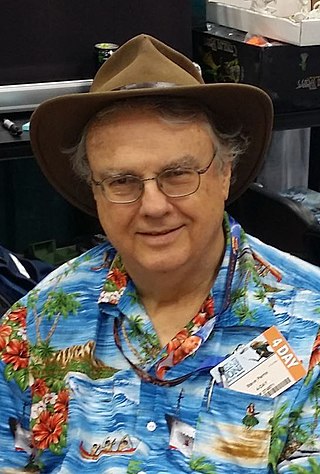
Stephen Herbert Perrin was an American game designer and technical writer/editor, best known for creating the tabletop role-playing game RuneQuest for Chaosium.
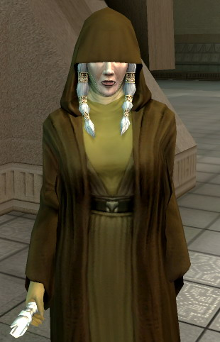
Kreia is a character and party member in Obsidian Entertainment's video game Star Wars Knights of the Old Republic II: The Sith Lords. She is a blind Force-sensitive who forms a "bond" with the player character, the Jedi Exile, through the Force. Kreia sets herself up as the Exile's mentor, and rejects the divide of the light and dark side of the Force, as well as the predestination the Force entails. By the game's end, it is revealed she is the Sith Lord Darth Traya and is planning on destroying the Force, and she becomes the final boss of The Sith Lords. Kreia makes no more appearances in Star Wars fiction, though a miniature by Wizards of the Coast was released in August 2008, and she appears as an obtainable character in Star Wars: Galaxy of Heroes.

Aaron Dale Allston was an American game designer and author of many science fiction books, notably Star Wars novels. His works as a game designer include game supplements for role-playing games, several of which served to establish the basis for products and subsequent development of TSR's Dungeons & Dragons game setting Mystara. His later works as a novelist include those of the X-Wing series: Wraith Squadron, Iron Fist, Solo Command, Starfighters of Adumar, and Mercy Kill. He wrote two entries in the New Jedi Order series: Enemy Lines I: Rebel Dream and Enemy Lines II: Rebel Stand. Allston wrote three of the nine Legacy of the Force novels: Betrayal, Exile, and Fury, and three of the nine Fate of the Jedi novels: Outcast, Backlash, and Conviction.

Van Buren was the codename of a canceled role-playing video game developed by Black Isle Studios. It was intended to be the third game in the mainline Fallout series. Set in the year 2253, the plot of Van Buren revolved around a prisoner who would explore the American Southwest while being chased by robotic prison guards. The main antagonist was a mad scientist named Victor Presper, who planned on using the prisoner as an inadvertent vector to spread a deadly virus. Gameplay would have included a mixture of real-time and turn-based combat. The player would explore the map with a team of non-playable character (NPC) companions. Each NPC would make their own independent decisions which would affect the story.
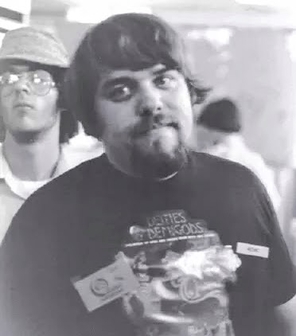
James Michael Ward III was an American game designer and fantasy author who worked for TSR, Inc. for more than 20 years, most notably on the role-playing game Dungeons & Dragons. He wrote various books relating to Dungeons & Dragons, including guidebooks such as Deities & Demigods, and novels including Pool of Radiance, based on the computer game of the same name.
Colin McComb is an American writer and game designer, who is best known for his work designing the Planescape setting for the Dungeons & Dragons role-playing game, and as the creative lead for the role-playing video game Torment: Tides of Numenera. He is the co-founder of 3lb Games, a virtual reality gaming studio.
The League of Champions are a superhero team first appearing in 1981 in the Champions role-playing game by Hero Games, and subsequently in comic book series published first by Eclipse Comics as Champions in 1986, and later by Heroic Publishing as League of Champions starting in 1987. The fictional heroes are headquartered in San Francisco.
George MacDonald is a game designer who has worked primarily on role-playing games and in the computer game industry.
Dennis Mallonee is an American writer and publisher of comic books. He is best known as the writer of the Champions comics and the founder of Heroic Publishing.
Steve Peterson is an American game designer who has worked primarily on role-playing games.
Ray Greer is a game designer who has worked primarily on role-playing games.

Adventurers Club was a quarterly magazine published by Hero Games and edited at various times by Steve Peterson, Bill Robinson and Bruce Harlick. It was started in 1983 and ceased publication in 1995. In total 27 issues were published.
Scott Bennie was a freelance game designer.
Ray Turney is a game designer who has worked primarily on role-playing games.
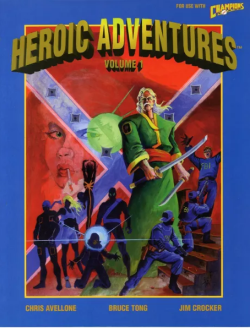
Heroic Adventures Volume 1 is a collection of three adventures published under license by Gold Rush Games in 1996 for Hero Games' superhero role-playing games Champions and Dark Champions.
Heroic Publishing is an American comic book publisher founded by Dennis Mallonee.